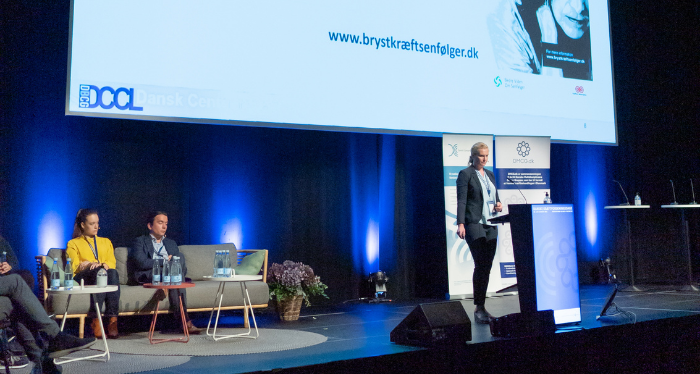
Pernille Bech presenting on stage at Danish Cancer Research Days, DKD2021, Photo: DKD2021, Rune Borre-Jensen
10-12-2021
Many women suffer both physical and mental late effects such as fatigue, sleep disturbances, anxiety, depression, pain, swelling of the arm and reduced shoulder mobility following cancer treatment. A new app supports these women by providing individual feedback. At the same time, new and important knowledge is gained.
In Denmark, 5,000 women are diagnosed with breast cancer annually and more than 70,000 women live the diagnosis. In addition to a well-functioning screening programme and treatment offers, support of these women after cancer treatment has ended can be improved.
The Danish Cancer Society has previously documented that half of all patients with cancer experience late effects. Thus, there is a need to improve knowledge on the extent and type of late effects.
"We have developed an interactive app where users are systematically asked about their late effects of breast cancer. The app adapts feedback and advice to manage these late effects,” says Pernille Bech, Project nurse at Department of Plastic and Breast Surgery at Aarhus University Hospital and a part of the National Centre for Late Effects of Breast Cancer. The national centre was established in 2018 and is funded by the Danish Cancer Society. The purpose is to systematically collect patient-reported data to identify patients at risk and to offer relevant prevention and treatment of late effects to patients with breast cancer.
Development of the app has been one of the major projects in the national research centre. Patients report how they feel and their symptoms in the app. The timing of the feedback is adapted to the women’s individual treatment plans.
- The app provides information, advice and counselling on the reported problems and symptoms
- The patient-reported data are collected in a database where researchers can get access. In this way patient-reported data is a source of new knowledge on late effects of breast cancer
- The doctor responsible for the treatment can follow how patients are doing in a clinician version of the app. The app is thus a tool to ensure a more qualified doctor-patient dialogue.
Pernille Bech has been responsible for testing and evaluating the new app. Today, more than 300 women with breast cancer use the app.
“My focus has been to evaluate the user experience and the conclusion is that the women are very positive. They feel well-informed and supported in a period where many are more or less left on their own”, says Pernille.
The app provides personal feedback
Pernille Bech presented her research at the Danish Cancer Research Days in August 2021. The project is particularly interesting because it uses new technology and has the potential to also benefit patients with other types of cancer.
"We use machine learning to analyse the patient-reported data. This means that a computer provides individual and targeted counselling on specific symptoms or side effects experienced by the patients. The patients feel they are heard and taken seriously, which reduces their worries.”
The patient-reported data can be used for research purposes e.g., by linking data from the app to other quality databases, Danish Breast Cancer Group (DBCG) and other relevant national registries.
While the users of the app receive treatment, they complete questionnaires at specific points in time relevant to their specific treatment. Later, users will complete questionnaires annually and data from these will in the future be used to detect disease sooner than we do today.
National implementation
The intention of the project is not only to register symptoms and late effects of breast cancer treatment nationally.
“We expect that this tool can be used for early detection of late effects. The app is not made specifically to detect relapse, but we expect that the tool will identify potential relapse at an earlier stage. We hope to identify patterns between late effects and gain knowledge of which effects are the result of specific treatment pathways”.
“The technical set-up can be used for patients with any type of diagnosis if the questionnaires and background data are adapted. It is our experience that a thorough pilot testing phase and implementation strategy are necessary”, says Pernille Bech.
Researchers from Danish Centre for Late Effects of Breast Cancer collaborate with DBCG and the health-tech companies Enversion A/S and Journi A/S. The hope is that other cancer specialities will be inspired, and they are happy to share their experiences.
The app is currently used Central Denmark Region and North Denmark Region. The plan is to implement the app in The Capital Region in the autumn of 2021.
